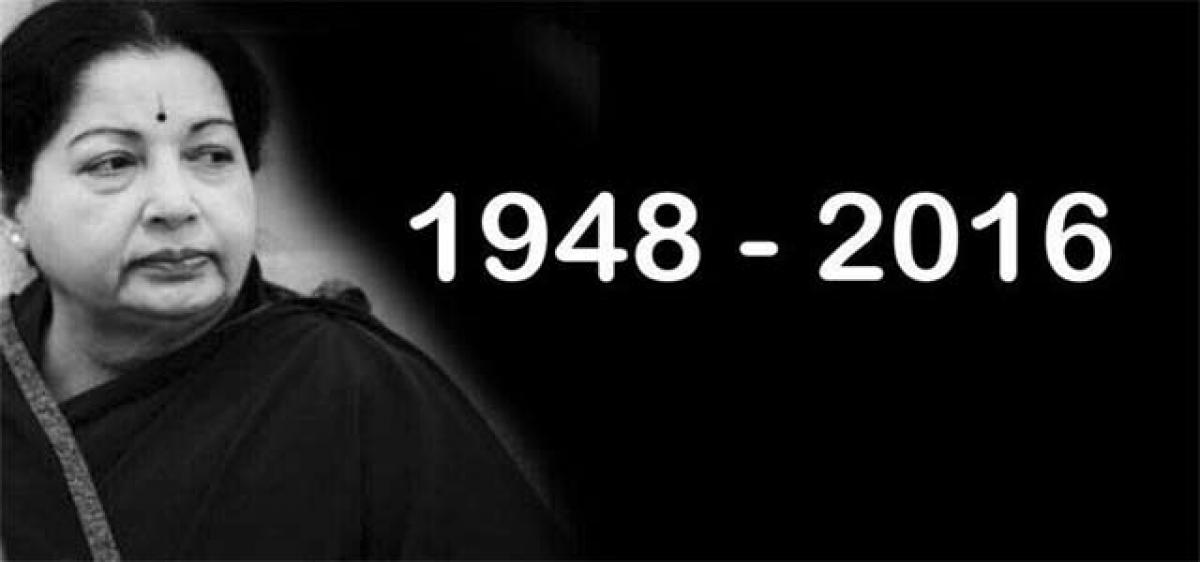A never-say-die leader

For someone to be so much loved and so much hated, it is difficult to balance life. But, Puratchi Thalaivi Jayalalithaa, who crossed over into the pages of history from the realms of the present, it was possible.
For someone to be so much loved and so much hated, it is difficult to balance life. But, Puratchi Thalaivi Jayalalithaa, who crossed over into the pages of history from the realms of the present, it was possible.
Jayalalithaa, it is said, is no more. It is said, I say, because it is hard to believe that the nearly 70 year old politician, who never blinked, even during her worst times, either in politics or during her film career, or in life and strode like colossus the firmament of Tamil Nadu politics, is no more.
Selvi Jayalalitha - if we drop the additional first English alphabet that she added due to numerological reasons - was ever the victim of Tamil Nadu politics.
One might ask, was she?
Valampuri John, former MP, who was by the side of Jayalalithaa during her formative political years and who published a semi-autobiographical novel and two books of essays, and who was discarded by her like all the men she was once affiliated or associated with, called her a "bundle of contradictions.
There is a deep rooted attitudinal problem which could be traced to her past. She perceives all men in her life - her father, MGR, her....friend Sobhan Babu - as people who failed her.
Therefore, she seems to have developed a deep distrust of almost everyone."
Jayalalithaa always suffered from a sense of being "used or misused" by all those who came close to her and hence, kept all those even distantly related out of bounds at her Poes Garden residence.
What stood out in politics and, as well, in her film career, was the fact that she never treated anyone as a superior or a super star. She treated them as her equals.
Mark the difference here...she did to treat herself as equal to her male colleagues, but treated them as equal to her.
That perhaps, best sums her up. She was not born to submit herself to the male world, or for that matter to anyone in the world as an inferior.
At best, the world had to live up to her expectations and come up to her level. That is it.
For record sake, Jayalalithaa was born on 24 February 1948, at Melukote, in Pandavapura taluka, Mandya district, then in Mysore State (now Karnataka) to Jayaram and Vedavalli in a Tamil Iyengar Brahmin family. That is what the Wiki says.
Trust me, it is true. It was updated by someone who knows Jayalalithaa's family intimately (details are being withheld to respect her preferences).
Jayalalithaa was given her grandmother’s name Koamalavalli at the time of birth. As per Brahmin custom, two names are given – one ancestral grandmother name and the other being personal name.
The personal name Jayalalithaa was adopted at the age of 1 for the purpose of using the same in school and colleges.
It was derived from the names of two houses where she resided in Mysore. One was “Jaya Vilas” and the other “Lalitha Vilas”.
Her paternal grandfather, Narasimhan Rengachary, was in the service of the Mysore kingdom as a surgeon, and served as the court physician to Maharaja Jayachamarajendra Wadiyar of Mysore.
Her maternal grandfather, Rangasamy Iyengar, moved to Mysore from Srirangam to work with the Hindustan Aeronautics Limited.
He had one son and three daughters – Ambujavalli, Vedavalli and Padmavalli. Vedavalli was given in marriage to Narasimhan Rengachary’s son, Jayaram.
The couple Jayaram-Vedavalli had two children: a son Jayakumar and a daughter Jayalalithaa. Her mother, her relatives and later co-stars and friends referred to her as Ammu.
Jayalalithaa’s father, Jayaram, was a lawyer, but never worked and squandered most of the family money. He died when Jayalalithaa was two years old.
The widowed Vedavalli returned to her father’s home in Bangalore in 1950. Vedavalli learnt shorthand and typewriting to take up a clerical position to help support the family in 1950.
Vedavalli’s younger sister Ambujavalli had moved to Madras and was working as an air hostess since 1948 and was also acting in dramas and films using the screen name Vidyaavathy since 1951.
After a while, on insistence of Ambujavalli, Jayalalithaa’s mother Vedavalli also relocated to Madras and stayed with her sister since 1952.
Vedavalli worked in a commercial firm in Madras and began dabbling in acting since 1953 under screen name Sandhya.
Jayalalithaa remained under care of her mother’s sister Padmavalli and with maternal grandparents from 1950 to 1958 in Mysore. She took on the screen name of Sandhya.
While still in Bangalore, Jayalalithaa attended Bishop Cotton Girls’ School. In later interviews, Jayalalithaa spoke emotionally about how she missed her mother growing up in a different city, and she had the opportunity to visit her mother during summer vacations.
After her aunt Padmavalli’s marriage in 1958, Jayalalithaa moved to Chennai and began to live with her mother. She completed her childhood education at Sacred Heart Matriculation School (popularly known as Church Park Presentation Convent or Presentation Church Park Convent) in Chennai.
She excelled at school and was offered a government scholarship to pursue further education. She won Gold State Award for coming first in 10th standard in not just her school but also in Tamil Nadu.
She appears not to have accepted the admission offered to her at Stella Maris College, Chennai. She is fluent in several languages, including Tamil, Telugu, Kannada, Hindi, Malayalam and English.
One could always question her aloofness or her seething anger. But, only Jayalalithaa knows what she had to undergo during her childhood with her mother being busy and father not being by her side. She could not trust anyone, however close one was as she felt insecure with herself.
Not many outside the family know that Jaya Manni (Vadina or sister-in-law), as she was known among those from her close relatives, never felt at ease attending family functions.
She never wanted to be part of any thus distancing herself "comfortably" from her near and dear ones. She also never realized that she was really loved by the extended family which never sought any favour of any kind from her at any point of time.
Sandhya Paati (grandmother) and Sandhya Atte (aunt) as her mother was variously called was a regular at family functions at both Mysore and Bangalore in those days.
The filmy connections of the family were not limited then. There was Vithalachaarya, the master of folk lore and technical mastery, in the family and C Seetaram, a director and producer of Bobbili Yuddham, too.
So films were not new to the extended family too. But, strangely, Jayalalithaa kept herself aloof. When it came to her, it was "omerta" and the siblings and near and dear ones obliged the code.
In fact, it is not just her, no one talked about films and film careers in the family because those who ventured into the same were "dishonourable" for the traditional family.
And those relatives admit that "she was never invited. Not for any marriage or any function. Why would she be?" Jayalalithaa's cousin's wife once remarked.
No one knows how much Sashikala knows despite being her close companion. Anyway no one grudges her in the family.
If it is true she had made her peace today with the TIME, let it be so. We too wish her the same.
(Jayalalithaa functioned on the principle. What Jaya wants Jaya shall get. And she gets her privacy not disturbed in the above piece too. The family misses her. Rest well, Manni).
Also Read:
A multifaceted actress Jaya's theatre and filmy career
Jayalalithaa was trained in classical music, western classical piano, and various forms of classical dance, including Bharatanatyam, Mohiniattam, Manipuri and Kathak. Shankar Giri, the son of the former Indian President V V Giri, saw her small role in the English play Tea Houses of August Moon and was impressed. Shankar Giri approached her mother Sandhya and told he wanted to cast her daughter in an English film called The Epistle...Click here to read the full post








